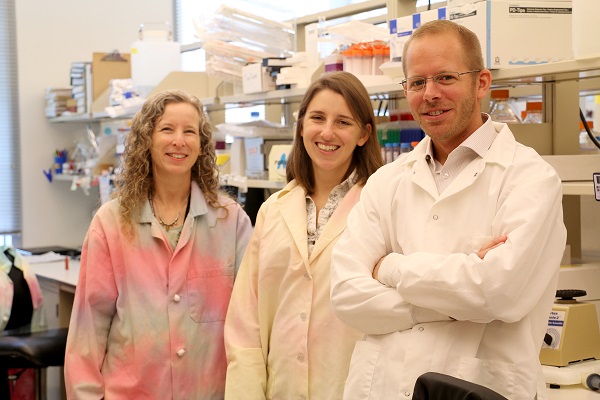Purdue jumps to 16th among universities granted patents

Purdue University is ranked 16th in the world among universities granted U.S. utility patents in 2014, according to a new report released by the National Academy of Inventors (NAI) and the Intellectual Property Owners Association (IPO).
This ranking in patent activity is up from the previous year's spot of 27th. In 2014, Purdue had 93 U.S. utility patents issued.
"We set out two years ago to make Purdue ‘Entrepreneur U’ by lowering every barrier and providing any support we could identify to enable our world-class faculty to move their research from lab to market,” said President Mitch Daniels. “This ranking joins other developments such as back-to-back years of record startup companies, as markers of real progress in becoming an economic engine for Indiana and the nation.”
The patents issued to Purdue represent innovations from nearly all of the university's core research areas including engineering, agriculture, science, computer science, technology, biomedicine, pharmaceuticals, health sciences, IT and veterinary medicine. A center of Purdue's interdisciplinary research is conducted at Purdue'sDiscovery Park and commercialization activities take place in the Discovery Park-based Burton D. Morgan Center for Entrepreneurship.
"Inventions and patents are a direct result of Purdue's growing research enterprise. Purdue has more than 400 research laboratories and 139 research centers and institutes where researchers, staff and students are working together to develop innovations," said Suresh Garimella, executive vice president for the Purdue Office of Research and Partnerships. "As a 21st century land-grant institution we are committed to improving lives through research and collaborations with private and public entities. This also is noted in the esteemed researchers at Purdue who are members of the National Academy of Inventors."
Purdue researchers who are National Academy of Inventors Fellows are:
* Rakesh Agrawal, the Winthrop E. Stone Distinguished Professor of Chemical Engineering.
* Jan P. Allebach, the Hewlett-Packard Distinguished Professor of Electrical and Computer Engineering.
* R. Graham Cooks, the Henry B. Hass Distinguished Professor of Analytical Chemistry.
* Michael R Ladisch, Distinguished Professor Agricultural & Biological Engineering.
* Philip S. Low, the Ralph C. Corley Distinguished Professor of Chemistry and director of the Purdue Center for Drug Discovery.
Purdue's intellectual property is protected through the Purdue Research Foundation Office of Technology Commercialization.
"Our technology commercialization team works closely with Purdue innovators to file disclosures, generate issued patents and assist in moving technology to the market, and it is a successful model in technology translation, and the results are impressive. This year alone more than 240 of our faculty and staff's innovations will be licensed to corporations and startups," said Chad Pittman, vice president for the Office of Technology Commercialization. "Strong interest from faculty, staff and student innovations and the new policies we have enacted to ease the disclosure and patent process have encouraged more patent filings and startup creation."
Purdue had record-breaking numbers in commcercialization activities in 2014.
Building on the success of Purdue's high volume of research activities, Purdue Research Foundation has enacted a number of policy changes and new programs to support technology commercialization. Among them, the establishment of the Purdue Foundry, a startup hub to help entrepreneurs; the Express License, a process to expedite license agreements; Foundry Investment Fund, to support Purdue-affiliated startups; and the innovation and entrepreneurship landing page, a web page of resources for entrepreneurs, investors and researchers.
Recent improvement in Purdue's corporate contracting options also has greatly stimulated sponsored research. As a system, Purdue was named the coveted 2014 Incubator Network of the Year by the National Business Incubation Association. For videos on startups formed from Purdue patents visit startups.
Rebecca Kramer, assistant professor in mechanical engineering, was named to the 2015 Forbes 30 Under 30 list for her research and patent filing in manufacturing.
"I have several provisional patents filed and am in the process of preparing full applications," Kramer said. "I appreciate the assistance I have received from Purdue in writing, filing and securing patents for my work. Based on the research I have observed at the university, I am not surprised that Purdue has ranked so high globally in patent activity."
The National Academy of Inventors and the Intellectual Property Owners Association based the report on data obtained from the U.S. Patent and Trademark Office. The NAI and IPO compile the rankings each year by calculating the number of utility patents granted by the U.S. Patent and Trademark Office, which lists a university as the first assignee on the printed patent.
To view the full report of the Top 100 Worldwide Universities Granted Patents in 2014 visit http://www.Academyofinventors.com/pdf/NAI-IPO-Top-100-Universities-2014.pdf . In conjunction, the IPO released its third consecutive annual Top 300 Patent Owners list of organizations worldwide that received the most U.S. utility patents during 2014.


 How to resolve AdBlock issue?
How to resolve AdBlock issue?